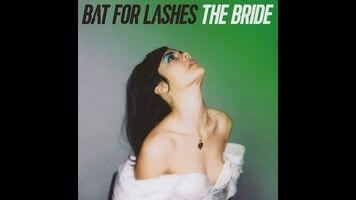Bat For Lashes tries to keep the flame alive on The Bride

Her music earns frequent comparisons to Kate Bush—how could it not, with her soprano voice and theatrical flair?—but Natasha Khan’s fourth album as Bat For Lashes, The Bride, is more reminiscent of Tori Amos. (Not that there’s a huge difference between the two, to be fair.) Amos mined similar thematic territory on her 1998 album From The Choirgirl Hotel, specifically the song “Jackie’s Strength,” about a bride who’s shot dead on her front lawn on the day of her wedding.
Inspired by a short film Khan directed last year, The Bride follows a parallel narrative, only reversed: A woman’s fiancé is killed in a car crash on the way to their wedding, so she goes on their honeymoon alone. The Bride is Kahn’s second concept album in her relatively short decade-long career, and she takes these concepts very seriously. (Khan has been promoting The Bride with shows set in churches where guests are encouraged to dress up as if they were attending a wedding.)
Appropriately, The Bride begins on a sweet, romantic note with “I Do,” featuring Kahn’s voice and a chiming harpsichord. The dreamy mood continues in “Joe’s Dream,” where she contemplates, “What does it mean? / The bad things I’ve seen,” while a gently throbbing beat plays. The plot moves forward in lead single “In God’s House,” where Khan’s bride character awaits her lover over a sexy, sinister synth line that wouldn’t be out of place in a Nicolas Winding Refn movie. A seductive darkness also hangs over “Honeymooning Alone,” which opens with the sound of breaking glass that fades into an echoing guitar line, evoking headlights on a lonely nighttime highway.
The overarching storyline also hinders the album. The Bride peaks early with “Sunday Love,” capping off a very strong front half with a catchy yet ethereal dance number that showcases Khan’s goth-pop side. Following the lonesome guitar on “Never Forgive The Angels,” though, the power of The Bride’s narrative begins to fade in a series of piano-focused ballads that, while uniformly beautiful—most everything she sings sounds beautiful—aren’t distinctive enough songwriting-wise to stand out from one another. (The most memorable song from the back half of the album, “In Your Bed,” sounds like it could have come from a different set of songs, judging by its lyrics.)
As a result, The Bride goes past dreamy and into lullaby territory after a while, and the listener’s engagement with the music may drift off as well. It makes sense as a musical choice—the part of the story where the heroine mourns her dead fiancé and resolves to someday love again probably wouldn’t inspire any upbeat pop songs. But, in this case, Khan may have prioritized the concept over the listening experience as a whole.